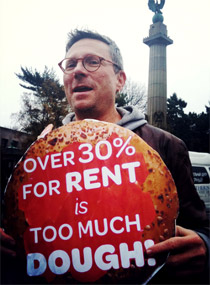"I'm paying over 71 percent of my check toward rent. A lot of times I struggle to make it to a medical appointment because I don't have transportation money," said 48-year-old Wanda Hernandez, who is HIV positive. Hernandez is one of thousands of low income HIV positive people who receive some form of rental assistance from the city's HIV/AIDS Services Administration.

The amount of rental assistance that a HASA client may receive varies depending on income. Hernandez, who makes a modest living working for a large corporation in the city, receives a small housing stipend and must pay most of her rent herself. This leaves her with little money to pay for basic things like electricity, a cell phone and transportation.
Some people receiving housing aid are guaranteed that their rent will total no more than 30 percent of their income from disability payments, with the government making up the rest, Hernandez and many other disabled people with HIV do not qualify for that.
Left with only about $340 a month after rent, Hernandez said, "I don’t get to travel, I don’t get to do social things that my friends will do, I cannot even buy toiletries because you can't buy them with food stamps."
Now, new policies adopted by HASA may make it even more difficult for people like Hernandez to obtain affordable housing, let alone pay for it.
The Limits of Assistance
In March, the administration announced that it was halving the amount of money it will pay to brokers working with HASA clients and will no longer provide cash security deposits to landlords who rent to their clients. Instead it will issue vouchers the building owners can use to request compensation for any damage. According to a study by Shubert Botein Policy Associates, 95 percent of HASA clients indicated these new policies as obstacles to securing affordable housing.
"My clients, because brokers are refusing to show them apartments or help them with housing, they're going back to sex work," Howard Haughton, program supervisor for case management at Village Care, said in a http://www.housingworks.org/activism/detail/new-nyc-policies-damaging-ability-to-find-aids-housing press release for Housing Works, which provides housing and healthcare support for people with HIV.
HASA currently serves 45,415 people in the city, an increase from 44,644 in May . Of these people, more than 26,000 receive some level of rental assistance. About 5,500 receive non-emergency housing and 1,700 receive emergency housing.
Affordable housing is a critical issue for low-income people diagnosed with HIV. With high living and medical costs, many must decide between paying their medical bills or rent every month.
Many of those who manage to obtain an apartment or rental assistance through HASA, still struggle to pay their rent because HASA assistance does not go far enough. To remedy that, Housing Works and other advocacy groups have pressed for the 30 percent rent cap for all of HASA clients. They argue that, without sufficient rental assistance from the city, many HIV positive people move into homeless shelters, where their chances of transmitting the disease and of their health deteriorating increases sharply.
"We should all be protected by the 30 percent rent cap, whether we live in supportive housing or not," Hernandez said.
In addition, HASA only provides rental assistance to people who have been diagnosed with AIDS. According to organizations like VOCAL, an advocacy group for low-income people with HIV, this spurs some low-income people who are HIV positive but do not have full-blown AIDS to stop taking the medication that will keep their disease from getting worse.
"The perverse thing is that if someone is newly diagnosed and they're HIV positive but they're in the shelter they face a choice between going on meds and hopefully staying healthy and not progressing to AIDS, but that means they stay in the shelter. Their other option is not taking their meds and not going to the doctor, so they get sick enough to qualify for a rental subsidy," VOCAL spokesperson Sean Barry said.
Limiting HIV's Spread
The city has adopted many policies over the years to improve the lives of residents living with HIV/AIDS and prevent the transmission of the disease. It was one of the first cities to adopt a free needle-sharing program to reduce HIV transmission, and its HASA program is one of the largest of its kind in the country. In addition to housing, HASA also provides its clients with medical care, employment and vocational services, counseling, and Medicaid and food stamps benefits.
Despite these achievements, New York City has over 107,000 people infected with the HIV/AIDs, a rate almost three times the national average. The New York metropolitan area has the fourth highest rate of AIDS – number of cases per 100,000 people -- in the country after Miami, Baton Rouge and Jacksonville. Even after decades of breakthroughs in medical treatment of HIV that have drastically increased the life spans of people with the disease, HIV remains the third leading cause of death for New York City residents.
To reverse this, many academics and advocates believe that the city should expand its HASA program to all low-income people with an HIV diagnosis and guarantee none of these people pays more than 30 percent of his or her income toward rent.
Studies by the Centers for Disease Control and the Department of Housing and Urban Development have shown that having a stable home is crucial to maintaining the health of people with HIV and reducing the transmission of the disease.
"When you control for every other type of intervention, housing makes the number one difference in someone's health and how likely they are to transmit the disease to someone else," Kristin Goodwin, director of New York City policy for Housing Works, said.
Angela Aidala, a professor of public health at Columbia University, has done extensive research on the effects that housing has on the lives of people living with HIV. In her work she has found that the little things that go along with having a permanent home can prove crucial in reducing the transmission of HIV and maintaining the health of those infected.
"People who are unstably housed are much less likely to have the supportive networks that can provide them with social support. If you need a ride to an appointment or a reminder to take your medication, all of those things that the rest of us who live in stable housing take for granted, are absent for those who do not have stable living arrangements," she said.
Aidala added that people who are homeless or unstably housed have little structure in their lives and struggle to maintain permanent relationships.
"That means there are more partners, more transactional sex, more casual sex," she said.
According to Aidala, the earlier people with HIV receive healthcare and adequate housing from programs like HASA the better.
"If people had healthcare as soon as possible after finding out they were positive and they had other resources like stable housing and adequate food, would it reduce transmission? Certainly that's what the data that we have now would indicate," she said.
Paying the Bill
Although research has shown that housing plays a critical role in fighting the HIV/AIDS epidemic, the city and state have rejected legislation to extend HASA to all low-income people with HIV and guarantee a 30 per cent rent cap because of the projected cost. In 2008, City Councilwoman Anabel Palma introduced a bill called HASA for All, which would have expanded HASA rental assistance to all qualified HASA applicants diagnosed with HIV. The bill, opposed by City Council Speaker Christine Quinn who said it was too expensive, never made it to the floor for a vote.
On the state level, a year ago, a bill that would have guaranteed a 30 percent rent cap for all HASA clients passed both chambers of the state legislature, but was vetoed by former Gov. David Paterson also because of its price tag.
Despite the initial high costs, advocates of these two bills believed they would have saved the city and state money in the long run.
"If somebody becomes homeless as a result of being evicted because they can longer afford to pay 60 percent of their limited income for housing, the city and state are required to provide them with emergency housing which is frequently substandard and more expensive,” Assemblymember Deborah Glick, the author of the rent cap bill, said. "While there may have been some start-up costs, we believe in the end [the rent cap bill] would be saving money."
Goodwin of Housing Works said a program like HASA for all would reduce Medicaid costs and spending on emergency housing and homeless shelters.
"Housing is very expensive so it seems like it's not worth it financially, but in the long run if you look at everything else, it's the most cost effective thing you could do," she said.
Beyond housing, many low-income HIV positive people also need counseling, job training, and medical services. Supportive housing offers this in addition to a place to live, but the city's supply falls short of the need, according to Goodwin. Housing Works currently has long lines for 170 supportive housing units that it owns.
In an e-mail interview, city Human Resources Administration spokesperson Carmen Boon said she did not expect any proposals to guarantee a 30 percent rent cap would be introduced in the state legislature anytime soon.
Echoing Boon's words, Glick said she does not plan to reintroduce her bill in the near future. "We are in a regroup process. We lost a number of people who were yes votes and we lost a number of Democratic seats in the [2010] election," she said.
VOCAL spokesperson Sean Barry said he has little hope that the city would pass something like HASA for All with its tight budget and different priorities.
"We've seen a wholesale abandonment of Bloomberg's first term promise to both reduce the amount of HIV infections in the city and significantly reduce the population of homeless New Yorkers," he said.
Barry has more faith in Gov. Andrew Cuomo.
"We've got a governor, a former HUD secretary who worked on homelessness in the '80s, so we think we have a sympathetic audience in Albany," he said.
According to Barry, VOCAL wants to get the rent cap bill enacted through Cuomo's Medicaid redesign process. Barry said members of Cuomo's administration have acknowledged that soaring Medicaid costs in the state can be partially attributed to homeless people cycling in and out of hospitals.
"If you give someone affordable housing with a rent cap, you're going to spend less money on shelter costs. … That's before you even consider Medicaid savings, which will be even more savings, but indirect savings," he said.
As for the city, Barry said he is looking forward to the 2013 mayoral election.
"People with HIV are starting treatment much earlier on so they don't progress to AIDS and that means we must acknowledge that our medical eligibility for HASA assistance, which was developed in the 1980s, is outdated. We want to make [eligibility for HASA] an issue in the next mayoral race," he said.
